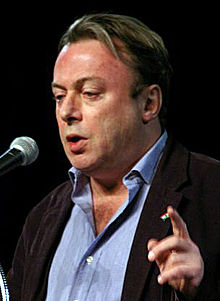|
At first I thought Chris Hayes was a trifle callow when he began making cameos on MSNBC, but he has quickly become one of the most thoughtful talk-show hosts on television.
And my long-time impression of Christopher Hitchens was of a skanky mixture of alcohol, tobacco and ego, but now I am enjoying his last collection of essays. My wife kept saying there was more to both of them, and she’s usually right. (She told me to take a fresh look at the noted wingnut Ted Turner during his hilariously epic Goodwill Games venture with the old Soviet Union in the late ‘80’s.) Hayes was tall and young and enthusiastic when he started to pop up on the Rachel Maddow show. It wasn’t that I disagreed with him about much, but I just didn’t think the world needed another true believer on the left or right. Fortunately, somebody saw enough to give Hayes his own show, Up w/Chris Hayes, on Saturday and Sunday mornings from 8 to 10 on MSNBC. He knows his stuff, and he also lets his guests speak – in paragraphs, in complete thoughts – without shouting them down or belittling them, which is surely the mode on cable these days. Hayes is a master of getting smart guests, most of them from the liberal end, but he is gracious and fair to all guests (as is the well-prepared Maddow.) Last Sunday Hayes had three panelists I did not know, all of them interesting, as well as Edward Conard, who helped build Bain Capital and is the author of the current book, Unintended Consequences: Why Everything You’ve Been Told About the Economy Is Wrong. In the course of a civil conversation, Conard agreed that Mitt Romney was “legally” the CEO of Bain until 2002, a point Romney does not choose to concede. I could not tell if Conard felt he was able to fully represent his book, but he seemed to fit in with the other panelists. (Melissa Harris-Perry strikes pretty much the same thoughtful tone on MSNBC on weekends from 10 to noon. May their tribe increase.) Christopher Hitchens was an acquired taste. I had caught him preening and pontificating over the years and was mostly turned off. (As my friend Pincus once said about somebody at work, we grew up in different schoolyards.) A few years ago, at my wife’s urging, I read Hitchens’ memoir, Hitch-22, about a life far more Dickensian than I could have imagined. After he died, I began reading his last book, Arguably: Essays. Hitchens takes readers places we do not have time to explore – authors, countries, mind sets. I have no idea how he managed to know so many people, be so many places. He even had himself waterboarded -- without Dick Cheney ordering it. Just one essay will stand in for all of them. Given the ferment that has come out of Tunisia in the past few years, I was delighted to discover Hitchens had visited there for a July 2007 essay in Vanity Fair. It began: If we all indeed come from Africa, then the very idea of Africa itself comes from the antique northern coast of the great landmass, where the cosmology is subtly different and where the inhabitants look north to Europe and southward at the Sahara. Here was the mighty civilization known as Carthage, which came as close as possible to reversing what we think of as the course of “history” and conquering Europe from Africa instead of the other way around. With its elephants and armies and under the brilliant generalship of Hannibal, it penetrated all the way through Spain and France and down over the Alps… Hitchens soon introduces us to the wine and cuisine and feminism and education level of modern Tunisia as well as the tensions within Islam that more or less prepare the reader for the revolution that followed. I am going through the Hitchens collection slowly, hoping somehow it will keep expanding. Wouldn’t it be wonderful if that avowed atheist found a way to file from the beyond?
Charles in Absecon
7/20/2012 09:27:37 pm
Rethink Hitchens? Not ready to that, but I applaud you for being openminded enough to do so.
George Vecsey
7/21/2012 04:47:31 am
Some of Hitchens' stances are arcane. He turns mid-sentence on friends and others I thought he was praising, but he knows so much...
Christopher Mankiewicz
7/25/2012 09:32:43 am
What little I've seen & heard of Hayes is pretty lightweight though superficially quite intelligent.
George Vecsey
7/25/2012 02:25:12 pm
Fair enough. They are totally different beings. Hayes knows a lot and conducts a civil discourse with smart panelists, not the usual suspects who are wearing thin. He stays on a subject for a long time, and raises important issues. Thanks for your comment. Glad to have your viewpoint. GV 8/20/2012 10:38:01 pm
Rethink Hitchens? Not ready to that, but I applaud you for being openminded enough to do so. Comments are closed.
|
Categories
All
|











